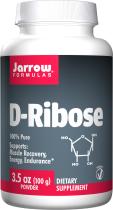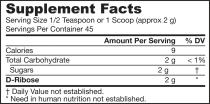Related posts
Feature
Pure D-Ribose Powder May Improve Cellular Energy Levels* 100 % Bioenergy Ribose Production Protected by 4 U.S. PatentsDescription

Product Profile
Jarrow Formulas Ribose (100% D-ribose) is for athletes and others interested in improved energy, endurance, and recovery.* Ribose is a carbohydrate found in every cell in the body. It is an important component of DNA and RNA, structures that make up our genes. Ribose is also an essential precursor to ATP, the bodys main energy source.* Research since the 1970s has continued to confirm the benefit of this compound for the heart and circulation, and recently for energy metabolism in skeletal muscles.*
Energy Production By The Cells
ATP (adenosine triphosphate) contains ribose, adenine, and three conjoined phosphate groups. Energy transfer involves the linking and unlinking of these phosphate groups. Thus, ATP provides energy when it loses a phosphate group to become ADP (adenosine diphosphate), or when it loses two phosphates to become AMP (adenosine monophosphate). Phosphate groups must be added back to AMP and ADP to replenish ATP. Creatine, another popular supplement for athletes, and the creatine phosphate system help muscles quickly replenish ATP during intense exercise by doing just that.*

Distinguishing Features:
- Produced via microbial fermentation
- Bioenergy ribose
Ribose Links To Energy
Under extreme stress, or in certain disease states, phosphate groups do not reattach to form ATP, and ADP is further broken down into AMP. The build-up of AMP in cells is not a stable condition, so some AMP is removed, resulting in the loss of adenine and ribose. Loss of these components in cells decreases energy storage capacity and makes it harder for the body to store and transfer energy. Cells cannot absorb ATP from blood, so each must make its own ATP. At any one time, enough ATP is stored in the body for about 10 seconds of all-out exertion so it is imperative to keep the ADP-to-ATP energy cycle flowing smoothly. The more active the muscle, the more ATP it uses. During intense exertion, skeletal muscles quickly exhaust their ATP stores; heart muscle is particularly vulnerable to ATP shortages. As an ATP precursor, active muscles can therefore benefit from ribose supplementation.*
Ribose Improves Muscle Energy And Recovery
It should be noted that ribose is not readily available in amounts near recommended quantities from any food source. The body must make ribose from glucose through a series of complicated and energy-intensive steps. Unfortunately, this process is quite slow and may actually require days to complete. Supplemental ribose, in contrast, is immediately available to the body.* The body uses ribose energetically in three ways:
- Ribose can be used to produce glucose and glycogen (the storage form of carbohydrate energy). While offering the energy benefits of sugars, ribose does not affect blood sugar levels.*
- When oxygen is available, ribose can be converted into pyruvate, another energy source.*
- Most importantly, ribose is necessary for ATP production. With ribose, cells can recover rapidly from intense exertion.*
Research has shown that intense exercise causes significant adenosine phosphate decreases in skeletal muscle. These energy carriers were not fully replaced even after 72 hours of rest. This may be an important consideration in overexertion and in over-training. Research presented at the American College of Sports Medicine meeting in 1999 indicates that ribose supplemention may greatly reduce recovery time after intense exertion.* Indeed, ribose is the immediate precursor to PRPP (5-phosphoribosyl-1-pyrophosphate), which is the rate-limiting factor in ATP synthesis. For athletes, this is of major importance. The synthesis of the adenine/ribose component of ATP is 3-6 times faster with ribose supplementation.* Ribose is one of the necessary building blocks for the formation of ATP, the universal energy molecule in the body.* Physical stress can deplete ATP stores in cardiac and skeletal muscles. As the rate-limiting substrate in the synthesis of nucleotides, including ATP, ribose plays a vital role in replenishing ATP, thus, enhancing energy production, improving muscle recovery, and thus Muscle Edge.*
*These statements have not been evaluated by the Food and Drug Administration. This product is not intended to diagnose, treat, cure, or prevent any disease.
